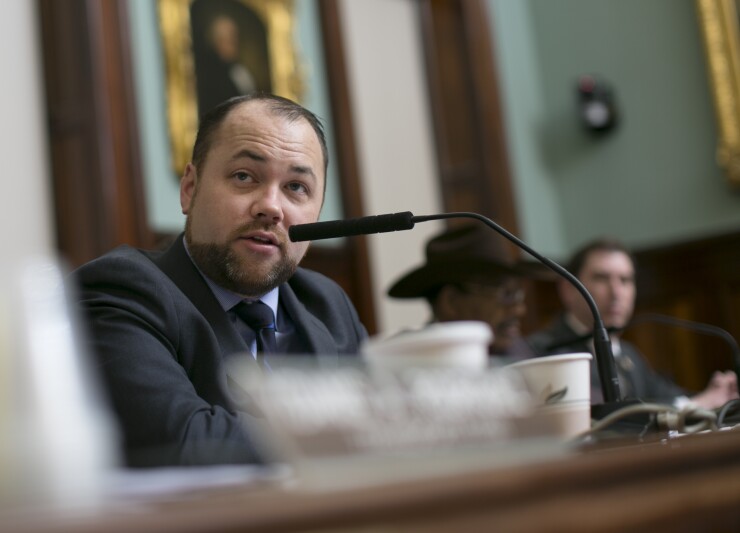New York City Council members say the city’s massive capital program needs right-sizing.
The problem of appropriations far outweighing planned and actual spending has spanned several mayoral administrations, according to council Speaker Corey Johnson.
“This is not new,” Johnson said Tuesday at a joint meeting of the finance committee and capital budget subcommittee. According to Johnson, it marked the first council hearing dedicated solely to the capital program, for which the city sells bonds.

Johnson formed the subcommittee, which Vanessa Gibson chairs, when he became speaker in January. He wants more council input in the capital program. While that program typically gets short shrift during budget deliberations, it is arguably more significant, given the large-scale borrowing.
“For too long, the majority of our attention, the public’s attention, the advocacy attention, has been on the expense portion of the budget,” said Johnson. "This has left mayoral administration after administration to manage the capital budget process largely without the rigorous review it deserves."
The council is considering Mayor Bill de Blasio’s proposed
Also before the council is de Blasio’s $88.7 billion executive budget. The mayor is scheduled to release his executive budget in late April.
According to Johnson, an excess balance of capital appropriations — $20.5 billion for fiscal 2018, for instance — gives the administration and agency heads too much leeway in executing capital programs without seeking a modification from the City Council.
“As always, we will approach the capital budget process with caution,” de Blasio budget director Melanie Hartzog responded. “We're working aggressively with the agencies to right-size their capital plan.”
Displaying a chart on the council floor, Johnson said he favors an appropriations ceiling of 15% above fiscal-year commitments. Deputy budget director Charles Brisky opposed such a move, prompting a testy exchange between Brisky and Johnson.
“We want to maintain flexibility to keep projects moving along. If you risk contingencies too low, you will bring the capital commitment program screeching to a halt,” said Brisky. “I think your chart is misleading.”
Johnson replied: “Can you provide a chart that’s leading and not misleading?”

Hartzog said the administration added $209 million to improve heating systems at New York City Housing Authority Developments, bringing de Blasio’s capital allocation for NYCHA to $2.1 billion.
The NYCHA plan earmarks $9 million for “rapid response” to heating emergencies. The remaining $200 million will fund boiler replacement and heating-systems upgrades at 20 problematic NYCHA developments.
NYCHA is in crisis mode after a winter in which heat and hot water have been lacking at many developments citywide. Gov. Andrew Cuomo last weekend pledging an additional $250 million for NYCHA in this year's state budget on top of a previous $300 million earmark.
Cuomo and de Blasio have blamed each other over NYCHA's woes.
Hartzog said the city will continue to estimate debt service cautiously, and ensure that debt service does not exceed 15% percent of city tax revenue, which she called “the benchmark of responsible capital finance.”
New York’s record-high bond ratings reflect that standard, she said. Fitch Ratings and S&P Global Ratings rate the city’s general obligation bonds AA, while Moody’s Investors Service rates them Aa2. All assign stable outlooks.
New York has $36.7 billion in GO debt as of Dec. 31. The preliminary capital plan estimates $51.2 billion in long-term borrowing between FY18 and FY22.
Hartzog acknowledged the budgetary threats from the state and city.
She said the elimination of advance bond refundings under President Trump’s new tax law will cost the city roughly $100 million annually in expense budget savings.
“With respect to the capital budget, eliminating these type of refundings may impair our ability to refinance bonds on favorable terms,” said Hartzog. “As a result, the cost of building and repairing roads, bridges, schools, and other critical infrastructure may increase.”
Hartzog said Cuomo’s proposed budget shifts responsibility for funding the Metropolitan Transportation Authority’s $17 billion New York City Transit capital program to the city. This would supplement the city’s current $2.5 billion capital commitment and $1.8 billion in direct and in-kind contributions.
The additional obligation, said Hartzog, “would jeopardize our capital budget, endanger our bond ratings and lead to a drastic reduction in city services.”
Sean Campion, a Citizens Budget Commission senior research associate, said capital commitments remain high and front-loaded. “In short, the commitment plan remains unrealistic in its ambition, obscures capital priorities and discourages accountability for completing capital projects efficiently.”
Campion called the preliminary capital commitment plan and its guiding 10-year strategy too large. Infrastructure repair, he said, deserves priority over questiomable economic-development initiatives.
Other problems, said Campion, include escalating debt; failure to consider the effects of maintenance or debt costs on the operating budget; insufficient data to track project-level spending; lack of asset-management policies for routine maintenance.





